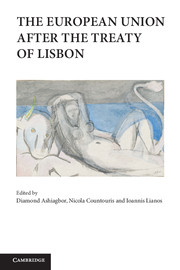Book contents
- Frontmatter
- Contents
- The European Union after the Treaty of Lisbon
- Introduction
- 1 The institutional development of the EU post-Lisbon
- 2 Competence after Lisbon
- 3 The Charter, the ECJ and national courts
- 4 Accession of the EU to the ECHR
- 5 EU citizenship after Lisbon
- 6 The law and politics of migration and asylum: The Lisbon Treaty and the EU
- 7 The European Union's common foreign and security policy after Lisbon
- 8 The European Ombudsman and good administration post-Lisbon
- 9 European contract law after Lisbon
- 10 Competition law in the European Union after the Treaty of Lisbon
- 11 The unexpected revision of the Lisbon Treaty and the establishment of a European stability mechanism
- Index
- References
8 - The European Ombudsman and good administration post-Lisbon
Published online by Cambridge University Press: 05 June 2012
- Frontmatter
- Contents
- The European Union after the Treaty of Lisbon
- Introduction
- 1 The institutional development of the EU post-Lisbon
- 2 Competence after Lisbon
- 3 The Charter, the ECJ and national courts
- 4 Accession of the EU to the ECHR
- 5 EU citizenship after Lisbon
- 6 The law and politics of migration and asylum: The Lisbon Treaty and the EU
- 7 The European Union's common foreign and security policy after Lisbon
- 8 The European Ombudsman and good administration post-Lisbon
- 9 European contract law after Lisbon
- 10 Competition law in the European Union after the Treaty of Lisbon
- 11 The unexpected revision of the Lisbon Treaty and the establishment of a European stability mechanism
- Index
- References
Summary
Introduction
This chapter begins with an explanation of the European Ombudsman's mandate, following the changes brought about by the Treaty of Lisbon. It then examines other developments introduced by that Treaty, which are of direct relevance to the Ombudsman's work. These include improvements in the area of transparency, public participation, and the role played by national parliaments. The Charter of Fundamental Rights, now legally binding and including the right to good administration, is also mentioned. The chapter concludes with a more detailed look at good administration as a legal right and at principles of good administration more generally.
The Treaty of Lisbon: A focus on the Ombudsman's mandate
The Maastricht Treaty, which entered into force in 1993, established the European Ombudsman in order to enhance relations between citizens and the European Union level of governance. The Ombudsman is empowered to investigate ‘maladministration’. This concept will be examined in detail. The Ombudsman may act either in response to complaints, or on his own initiative.
- Type
- Chapter
- Information
- The European Union after the Treaty of Lisbon , pp. 210 - 226Publisher: Cambridge University PressPrint publication year: 2012
References
- 2
- Cited by



